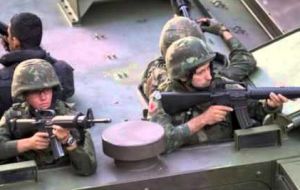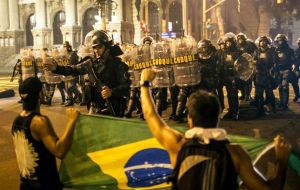MercoPress. South Atlantic News Agency
Riots in Rio following death of a dancer allegedly by police; in Sao Paulo 34 buses set on fire
 Special police forces heavily armed surround the favelas next to Copacabana and Impanema
Special police forces heavily armed surround the favelas next to Copacabana and Impanema Violent protests broke out in Rio do Janeiro's tourist heart of Copacabana on Tuesday following the death of a professional dancer less than two months before the World Cup.
Two main thoroughfares were closed after angry demonstrators from a favela (slum) set ablaze barricades of tires to protest the death believed to be killed by a police unit who took him for a drug trafficker.
The riot started as a protest after the body of the professional dancer from the Pavão-Pavãozinho favela, Douglas Rafael da Silva Pereira, was found in a school Tuesday morning. Police said his injuries appeared consistent with a fall; protesters suspected that he had been beaten to death.
A police officer at the scene said “some shots” were fired between suspected drug traffickers in the slum and police after the protests began. Police special forces then moved into the neighborhood, and residents who had fled or arrived home from work during the tumult were cautiously filing back in Tuesday evening.
However the Rio media reported that a second killing by a stray bullet had occurred during the clashes with police but the information has not been confirmed by the police or health care officials.
“There's smoke all over the place, shooting in the streets and people are running to their homes while trucks from police special forces battalion are moving into the favela” claimed several twits. Others claimed that power in the favela had been cut off as well as internet connection.
A police 'pacification' station in the favela was also attacked by protestors, and by “drug dealers' gangs” according to the police.
The Pavão-Pavãozinho and neighboring Cantagalo favelas which are just a few blocks away from Copacabana and Ipanema, the most tourist attraction beaches of the city are home to 10.000 people and since 2009 are under police control following the pacification policy implemented by authorities from the state of Rio do Janeiro.
However in recent months there has been an increase of clashes between the police and armed gangs supposedly linked to the drugs trade which still hide and take cover in the favela.
In related news Sao Paulo city reported that early Tuesday, 34 buses parked in an open garage in an industrial neighborhood were set on fire and totally destroyed. Apparently six heavily armed men were involved in the attack.
“The six men with faces covered and guns locked up the four watchmen and set the buses on fire”, said Miguel de Albuquerque, general manager of the transport company Urubupunga, who added that the incident has delayed the buses timetable.
Sao Paulo head of the Civil Police Mauricio Brasek said there are suspicions that the arson could be related to the narcotics trade, since one of their members was shot to death in that district.
“We have some video of the incident and of the men involved, but some of the cameras were heavily damaged by the fire” admitted Brasek. Losses were estimated in 4.3 million dollars.
With less than two months to the inauguration of the World Cup security has become the main concern of the Dilma Roussseff administration, foreign delegations and of FIFA, organizer of the event. This has meant fighting organized crime and drug traffickers who are deeply rooted in the favelas surrounding most Brazilian cities, twelve of which will be hosting Cup matches.





Top Comments
Disclaimer & comment rules-

-

-

Read all commentsJust a warmup until the start of the World Cup, who in their right mind would want to travel there.
Apr 23rd, 2014 - 08:42 am 0It's not looking good but history shows us that crime usually drops during a world cup as everyone is too busy watching the football and partying. I imagine Brazil of all places will be the same.
Apr 23rd, 2014 - 09:17 am 0'“...police special forces battalion are moving into the favela” claimed several twits.'
Apr 23rd, 2014 - 09:40 am 0Well there you go!
Commenting for this story is now closed.
If you have a Facebook account, become a fan and comment on our Facebook Page!